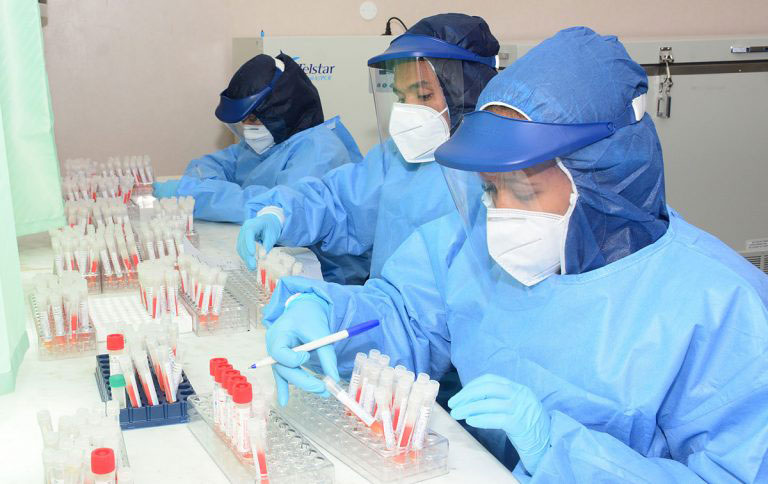“Getting my covid-19 result in less than 6 hours and not having to wait for days was a relief. The short turnaround time enabled me to make the appropriate and timely decision to self–isolate, says Oluwatoyosi Eniola, a health worker in Ado-Ekiti, Ekiti State.
Ms Eniola had experienced all covid-19 symptoms (headache severe enough to disturb her sleep, nasal congestion and cough) after returning from an official trip out of Ekiti, which prompted her to go to the clinic at her place of work for testing. The result was positive.
Fortunately, she did not have to wait for days before receiving her test result. Before then, the state government, supported by the World Health Organization, had introduced a new diagnostic kit Antigen Rapid Diagnostic Tests (Ag- RDT) intending to improve the covid-19 testing capacity in Ekiti State. Antigen-based rapid diagnostic test (Ag-RDT) is a new diagnostic tool that is fast and easy-to-deploy (generates results in 15-30 minutes) and a viable alternative to molecular-based platforms for confirming COVID-19 cases.
The antigen RDT was deployed to the Primary Health Care (PHC) level to enhance testing at community levels, making testing nearer to the people, improve result turnaround time and enable quick management decisions.
Since the onset of the pandemic in Nigeria, the laboratories used the real-time reverse transcriptase Polymerase Chain Reaction (RT-PCR) assays to detect SARS-CoV-2, the virus that causes the disease. However, there had been challenges such as accesst0 the test and the long result turnaround time.
For example, before the deployment of the Antigen RDT testing, there were only 27 sample collection sites in the 16 LGAs in Ekiti state. It posed the challenge for timely result turnover, especially at the PHC levels, where even symptomatic cases have had to wait for a minimum of 3- 4 days to know their COVID-19 status.
Also, some clients had to travel long distances from their settlements to the few sample collection sites, to submit samples for PCR tests as the only Real-time PCR testing facility is located in Ado Ekiti, the state capital. On average, it takes a minimum of 3days to get results depending on the number of samples collected.
Increase in reported cases
The introduction of the Ag-RDT has contributed greatly to increasing access to testing
The introduction of the Ag-RDT has contributed greatly to increasing access to testing, as they can be utilized at the point of care and results are released quickly. Nigeria as at 19 September 2021, has reported 201,630 cases with 2654 deaths.,Out of which 1,688 cases are from Ekiti state.. But with the introduction of the Ag-RDT testing in Week24 (June 2021) which concided with the onset of the Covid-19 third wave, there has been a steady increase in testing and confirmed cases in the state amounting to 91.2 % increase in cases reported. (Statistics from Ekiti Sitrep).
Complementing the government and WHO, Ms Eniola said “I am glad the waiting time for my result was short. The reduction in the waiting time is an encouragement for sick people as they don’t have to go through the torture of waiting to get to know their status.
Meanwhile, the Permanent Secretary, Ekiti State Ministry of Health, Mr Akinjide Akinleye (mni), commended the improvement in testing and reduced patient waiting time for results.
“I am happy with the response to COVID19 activities at the LGA level, with the increase in sample collection, early case detection, and all thanks to WHO for this timely intervention,” he said.
The intervention
To be able to use the Ag-RDT, it is important that those performing testing are adequately trained. In this regard WHO in collaboration with NCDC supported the state government to train 121 PHC laboratory officers and clinicians on the appropriate and safe use of approved Ag-RDTs for COVID-19 diagnosis.
WHO also provided logistics support for the activation of sample collection and testing at the PHC level across the 16 LGAs. Thus, Ag RDT testing sites increased from 27 to 147 across the State, with at least one Ag RDT testing site in a minimum of seven wards in each of the 16 LGA.
Highlighting the benefit of the decentralization of sample collection and testing sites, the WHO Ag. State Coordinator Dr Emmanuel Eyitayo said with Nigeria battling the ongoing third wave, quick testing and result turnover time will enable an early patient management decision, with health workers better protected thereby making it easier to control the outbreak.
The Acting SC noted that the results from the Ag-RDTs are nearly as accurate as those from RT-PCR (i.e. over 97% specificity) when conducted by appropriately trained health workers.
Antigen-Rapid Diagnostic Test is one of the effective tools for the diagnosis of COVID-19 cases. It is recommended to be adopted at the PHC level for rapid diagnosis and prompt decision making in the management of COVID-19 cases.


